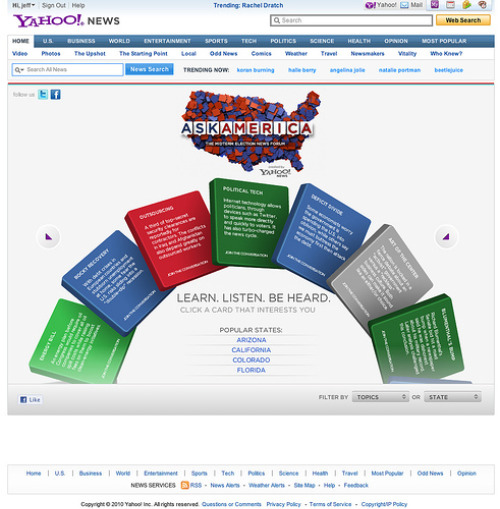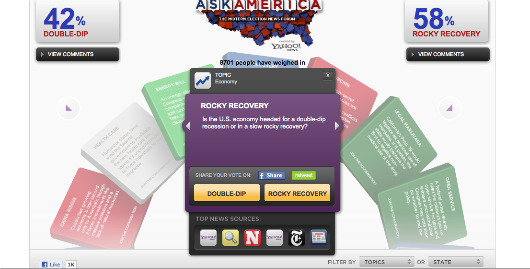Yahoo News’s recently launched “Ask America” site has an intro that comes at you like a Pixar rendering of Obama’s mystical post-partisan America—shiny blue and red tiles spread out from an unseen sinkhole in the middle of your screen, slowly forming a blue-red America-shaped mess. It’s very pretty in the end—very slick, very Times interactive-like—and there’s even some blue in the center and some red on the coasts.
Then comes the “Issues Wheel.”
As the map shrinks and floats to the top of the screen, a wheel of multicolored tiles, each labeled with an electoral issue (“Banks and Bonds,” “Western Islam”), takes over. Readers are invited to select a tile, read up on a subject, and answer the kind of question normally reserved for those sitting across from Christiane Amanpour. “With China’s speedy economic rise, can America still maintain its superpower status?” asks one. You click “yes” or “no” and can comment—America Answers.
Then comes the van. But we’ll get to that.
Several new websites and site additions have sprung up to compete for your political reading time this election cycle, and Yahoo News’s hyper-visual, hyper-interactive Ask America is perhaps the most ambitious. It began as an idea in a Yahoo News brainstorming session about a year ago; and, according to Yahoo News head Mark Walker, the notes taken in that meeting closely match the website launched September 10. He says the Yahoo team wanted to produce something special for the upcoming midterms and something that would affirm Yahoo’s lead in online news through to the 2012 presidential election.

“We felt very much, even a year ago, that no matter one’s political affiliation this election cycle would turn out to be an exceptional one,” Walker told me over the phone from Yahoo’s California offices. “This election was going to be seen to be a referendum on an historic presidency and it would probably deserve a lot more attention than a typical midterm election.”
The project the Yahoo News team developed over the past year to deal with that election is something Walker calls an “experience” and describes as having “layers.” For once, that’s not just PR hype. After choosing a tile on the “issues wheel”—which you can curate by state and topic area—users can dig pretty deep. On a subject like “Charlie Crist,” for example, a Yahoo visitor can read reports from The Washington Post and other organizations, pull up Yahoo News’s search results on the governor, and make an informed decision on whether they believe he’s an “Independent” or an “Opportunist” when prompted by the site. You can also see the percentage of respondents who agree, then comment on the issue and read the often-uninformative comments of others—“Shameless hussy,” “He isn’t an opportunist, he’s a conman,” etc. The usual social networking suspects then push such pearls out into the web.
“The individual elements of Ask America probably exist in one space or another,” says Walker. “I think what we’ve done is create a very robust poll destination site, which, at its heart, has a layer of social activation. And it manifests our ability to localize content. People can interact with the topics and issues that are really pertinent to where they live.”

The site is part of a coming larger effort for the midterms that only a mega news site like Yahoo could coordinate. (Walker says Ask America spans a number of groups in the “Yahoo matrix,” including news and editorial, the “custom brand experiences team,” Yahoo’s “global products and services partners,” the marketing and PR departments, and the social networking-focused “Yahoo Vitality Team.”). In about two weeks, we can expect to see an Ask America blog that will feature reports based on comments and polls on the site (as well as more scientific polling in partnership with ABC News), and op-ed pieces.
Then, in October, comes the Ask America Van. Walker says the branded van will travel the country, stopping at key campaign events to gather man-on-the-street video content to post online, and will be manned by a “preditor”—a producer and editor who will create news segments beyond the Q&As.
For now, what we have is the site, and despite the whizz-bangery of its tiles and layers and that nice Pixar-esque intro, it can feel a little stifling. Its Russian-doll structure—you dig deeper and deeper rather than linking out dynamically and independently—can feel restricting to readers used to experiencing news by jumping out from key words in a report to raw material, other reports, and commentary. Ask America in its current form feels like an effort to contain the Internet. In theory, a somewhat admirable idea—everyone from Clay Shirky to Jay Rosen has argued we need good filters to sort through the mass of online information—but in practice, here, it can be frustrating.

Compounding the problem is that the top news stories Yahoo offers readers, as curated algorithmically and overseen by Yahoo News editors, are often dated by weeks; some even by months. And Ask America heavily favors establishment outlets like The New York Times and the Post when listing its five top sources, regardless of whether they have the best reporting on the issue at hand. The trend exposes a downfall of a project this large and with this many parts: it’s difficult to maintain quality control at every “layer.” That can also be seen in the comments users are encouraged to leave. Despite a pretty rigorous automated and human comment moderation practice, it did not take me long to find a reference to the president as a “mutt” or one commenter who told Muslims to “go HOME to your sand dunes.”
There is also the inherent risk that Ask America’s myriad polls—which are based on a “whoever clicks here” sample—will be used by pundits and politicians to suggest trends that only exist on the shakiest of survey grounds. Walker points out that Ask America will also conduct more scientific polling in conjunction with ABC, but what’s to stop Marco Rubio, for one example, from saying in a speech or ad that, according to Yahoo News, sixty-six percent of Americans believe Charlie Crist is an “Opportunist”?
To be fair, the fun of Ask America—and everything with a wheel is always at least a little fun—is in the interaction, the social networking aspect of the site. It seems to work on this level, generating and furthering online political discussion among those who don’t spend their lives following Nate Silver and Charlie Cook. Still, whether it has an actual measurable impact on engaging a larger section of the electorate in the issues remains to be seen.
And Ask America also succeeds as an introduction to a number of issues for readers who live outside the TPMD-Politico beltway. If you want a brief rundown of the issues, a faint pulse of the nation, it’s a good place to start. And kudos to Yahoo News for producing a website that focuses on the issues important to the race, rather than the race itself (even if it does produce race-measuring polls). It’s an overall pretty solid product for a broad audience, with a few early kinks.
“The product is built very much for the Yahoo news audience,” says Walker. “And the Yahoo News audience has a very broad span in terms of demographic. We have a familiarity with the voice and interests of our audience and we hope Ask America is interesting both to the political dilettante and to those who are more seriously engaged with the political debate.” A few tweaks and Yahoo might just get there.
Joel Meares is a former CJR assistant editor.
